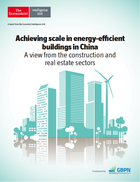Achieving scale in energy-efficient buildings in China: A view from the construction and real estate sector
 Highlight
Highlight
29 result(s) found
 Infographic: key findings from the recently released Intergovernmental Panel on Climate Change (IPCC) Fifth Assessment Report (AR5) for the buildings sector.
Infographic: key findings from the recently released Intergovernmental Panel on Climate Change (IPCC) Fifth Assessment Report (AR5) for the buildings sector.
A new briefing issued today distils the key findings from the recently released Intergovernmental Panel on Climate Change (IPCC) Fifth Assessment Report (AR5) for the buildings sector.
Potential gains from improving energy efficiency are substantial — not only in terms of saving energy and combating climate change, but also in terms of contributing to an array of other co-benefits, including improving human health and creating jobs. We asked Tim Farrell, Senior Advisor at the Copenhagen Centre on Energy Efficiency, what works best when it comes to boosting energy efficiency. He stressed that targeted policy measures and sufficient resources to support implementation and compliance are among a number of critical ingredients for success.
“Adopting Decarbonization Policies in the Buildings and Construction Sector” provides a review of the evidence of the impact of implementing cost-effective policy measures to reduce the carbon footprint of the buildings and construction sector.
An overview of climate change mitigation opportunities in the world's buildings is presented, based on the key building-specific findings of the Fourth Assessment Report from the Intergovernmental Panel of Climate Change. Buildings and the building stock can play a major role in mitigating climate change in the short- to medium-term, since substantial reductions in CO2 emissions from their energy use can be achieved over the coming years.
Accounting for over 70% of global CO2 emissions, cities are major contributors to climate change. Acknowledging this, urban climate change adaptation and mitigation plans are increasingly developed to make progress toward enhancing climate resilience. While there is consensus that focusing on both adaptation and mitigation is necessary for addressing climate change impacts, better understanding of their interactions is needed to efficiently maximize their potentials. This paper, first, provides a bibliographic analysis to map existing knowledge regarding adaptation-mitigation interactions.
To date, greenhouse gas (GHG) emissions, mitigation strategies and the accompanying health co-benefits in different economic sectors have not been fully investigated. The purpose of this paper is to review comprehensively the evidence on GHG mitigation measures and the related health co-benefits, identify knowledge gaps, and provide recommendations to promote further development and implementation of climate change response policies.